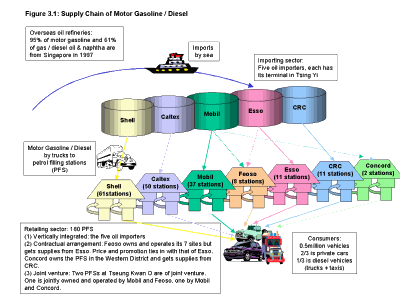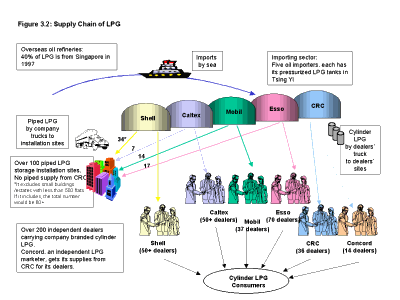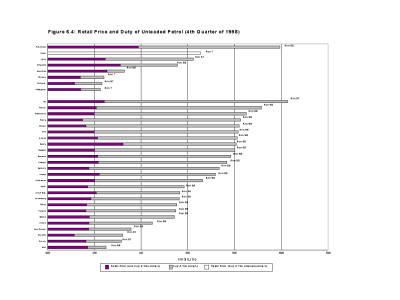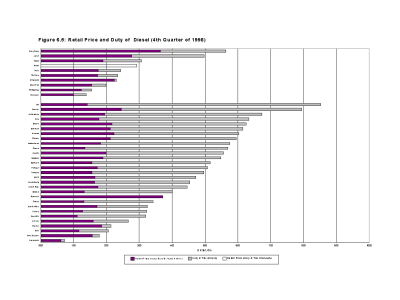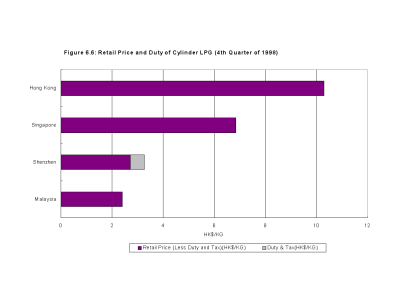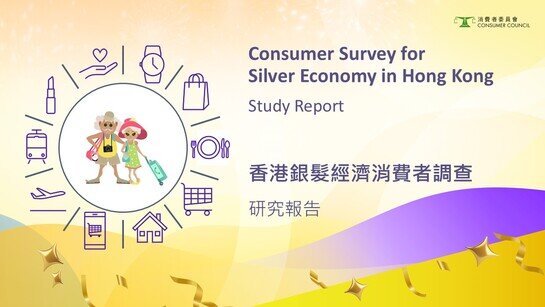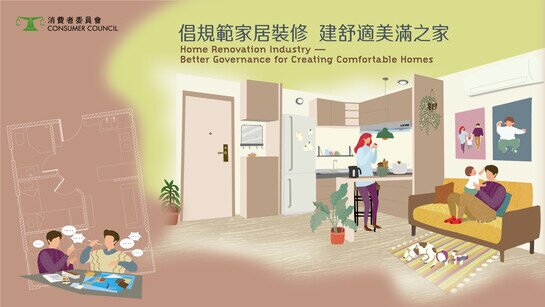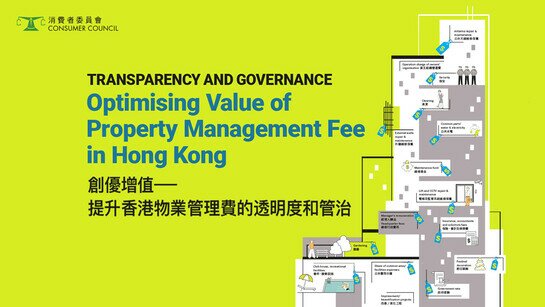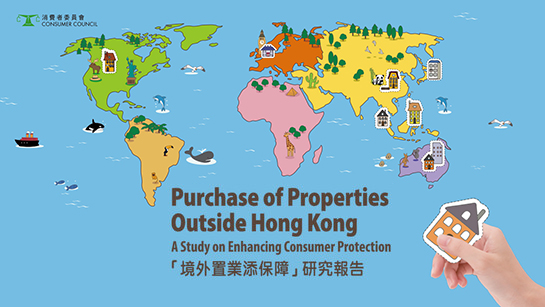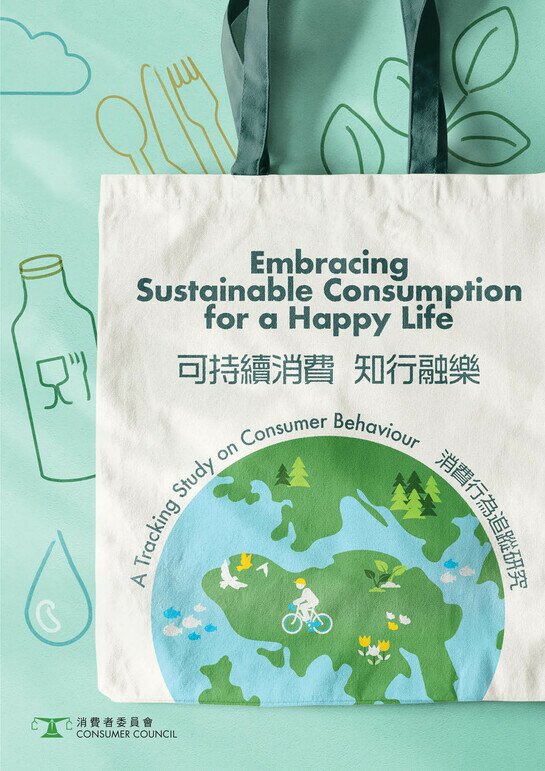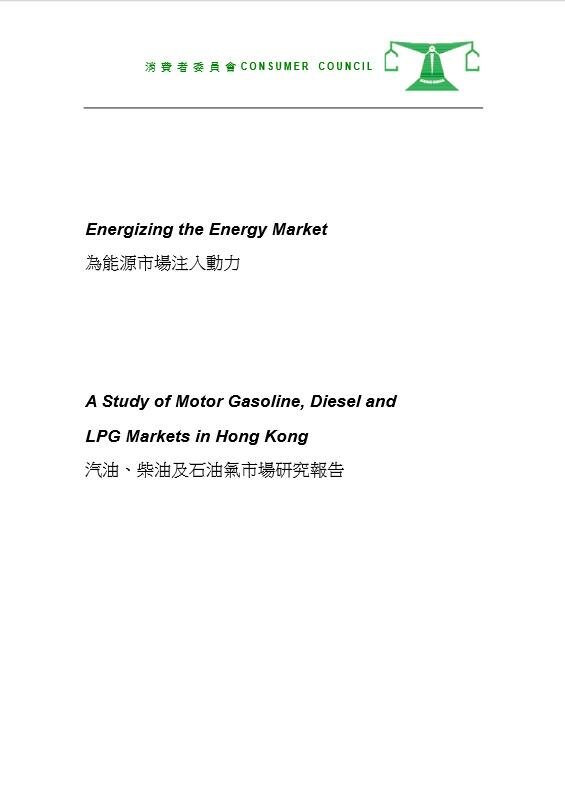
[This document is a summary of a Consumer Council study into the Hong Kong Motor Gasoline, Diesel and LPG Markets. A copy of the study, which details the results of inquiries, research and surveys into the three product markets is obtainable for purchase from the Council.]
Preface
- The Consumer Council (the Council) has long been concerned with the marketing of oil products in Hong Kong and its implications for consumers. In November 1998, the industry had also come under questioning from Members of the Hong Kong Legislative Council (LegCo) at the time. Concerns were that retail prices for motor gasoline, diesel and liquefied petroleum gas (LPG) might not be "reasonable", and that the sales of the products might not be taking place in a competitive market. The Council had prepared a submission for the LegCo Panel on Economic Services and made a number of observations that were ascertainable from information it had collected up until that time.
- Accordingly, in late 1998, the Council decided to embark on a study of the markets for the above three products, as and when manpower resources became available, in order to bring some clarity to the debate on the industry and to ascertain what, if any, recommendations it might have on how the industry could be made more competitive and efficient.
- The Council's work was intended as a starting point for industry action and for relevant government policy bureaux and industry departments, to carry on with their allotted roles with regard to competition, in line with the sector specific approach as enunciated in the Hong Kong Government's May 1998 "Statement on Competition Policy". That policy stated the Hong Kong Government (the Government) would promote economic efficiency and free trade through competition by:
a. identifying on a sectoral basis, obstacles and constraints imposed by the Government and other public sector entities which limit market accessibility and contestability and compromise economic efficiency and free trade to the detriment of the overall interest of Hong Kong, and removing them through voluntary, administrative measures as appropriate; and
b. initiating pro-competition measures, on a sectoral basis, in the government and private sector through administrative, legislative measures as appropriate.
- Accordingly, the Council's study examined:
a. industry trends and structure;
b. government regulations;
c. the different functional levels involved from supply to retail;
d. the state of competition in the various markets; and
e. makes recommendations for the Government and industry to consider.
- At the LegCo panel hearing in November 1998, the Economic Services Bureau (ESB) also indicated it would obtain costing and pricing information from the industry and conduct an analysis to ascertain whether prices were in fact "reasonable". ESB presented its findings to LegCo on 26 April 1999 and made a number of observations, based on confidential information that it had received from some industry participants. The Council was not provided with that confidential information and has had to rely on the public information contained in ESB's published report, insofar as the Council's study considers issues of costs and prices.
- The study has examined a number of areas, focusing on the markets for motor vehicle fuels (i.e. mainly unleaded petrol and diesel, but also including LPG), and the markets for cylinder LPG and piped LPG for use as a domestic hot water and cooking fuel. It is the culmination of all the information obtained, as of the present date, from a variety of sources. In particular, the Council acknowledges the assistance and information provided by the following organizations:
- BP Hong Kong Limited
- Caltex Oil Hong Kong Limited
- Census and Statistics Department
- Concord Oil (Hong Kong) Limited
- CRC Petrol Filling Station Co., Ltd.
- Customs & Excise Department
- Economic Services Bureau
- Electrical and Mechanical Services Department
- Esso Hong Kong Limited
- Feoso Oil Limited - Housing Authority
- Industry Department
- Lands Department
- Marubeni Hong Kong Limited
- Mobil Oil Hong Kong Limited
- Planning Department
- Planning, Environment and Lands Bureau
- Shell Hong Kong Limited
- Shenzhen Consumer Council
- Transport Department
- The petrol filling station site model in Chapter Four of the study was constructed with the assistance of Mr. Michael Tse, an ex petroleum industry executive. The Council wishes to express its appreciation to Mr. Tse for his assistance in preparing some of the material in that Chapter. The Council also expresses its appreciation to a number of business commentators and economists who provided valuable comments to the Council in the process of conducting the study. Set out below are the findings and recommendations arising from the Council's work.
Findings
Industry Overview
- In undertaking this study on the marketing of motor gasoline, diesel and liquefied petroleum gas (LPG) the Council's intention was to construct a starting point for relevant government policy bureaux and departments, to carry on with their allotted roles with regard to promoting competitive markets within their areas of responsibility, and to point out deficiencies in the market for industry action. This is in line with the sector specific approach as enunciated in the Hong Kong Government's May 1998 "Statement on Competition Policy". The Chapters in this study provide a range of information on the industry that should assist relevant government agencies in their work. This summary highlights the major observations of the study and lists various recommendations made by the Council, for ease of reference.
- The supply of energy and fuel to Hong Kong markets has come a long way from reliance on firewood, kerosene, manufactured gas for the privileged few, to universal coverage of electricity, cylinder LPG, piped gas, and motor vehicle fuels. The Government's attention has been on the safety aspects of oil products (characterized by various safety regulations) and ensuring stability of long term supply. Both of which are very important. Nevertheless, of equal importance is the need for competitive markets which through their effects on prices can be expected to lower the costs of doing business in Hong Kong and alleviate pressure on household expenses.
Oligopoly Markets
- The Council's study indicates that the oil products industry is highly concentrated (paras 9.18 to 9.24) and largely vertically integrated (paras 9.29 & 9.30), with three oil companies holding over 70% of the piped and wholesale cylinder LPG market, 90% of the motor gasoline market, and 80% of the diesel market (Table 9.1). It is characterized by relatively small total demand, limited growth opportunities (para 1.26), and barriers to entry such as the need to achieve economies of scale in storage and retail and the high cost of land (paras 9.31 & 9.32). As such the three product markets can be characterized as oligopolies. Theoretically, the consequences of this form of market structure can lead to cooperative behaviour, which may be explicit or implicit in form. Explicit collusion leads to a cartel, which is usually a target of scrutiny by jurisdictions with competition oversight. However, cooperation may also be implicit, in the sense that the few firms in the market recognize their mutual interdependence and realize that it is not in their interests to constantly drive prices down to marginal cost levels. In any case, a symptom of both explicit and implicit cooperation is that prices are uniform and above their competitive levels (paras 9.3 to 9.8).
- In a situation of tacit cooperation, i.e. shying away from direct across-territory price competition, oligopolistic firms may still engage in limited price competition that applies only to specific geographic markets and/or is tied to promotion schemes, product differentiation, as well as other forms of non-price competition. Evidence on these latter phenomena may be taken as proof that there is no explicit cartel, although it does not necessarily mean that the market is effectively competitive (paras 9.25 to 9.28).
- In the present study, given the limitations in data and information collection, no direct evidence of explicit collusion has been located. There are various indications that geographic price competition and non-price competition have existed, particularly in the past two to three years, perhaps because of the economic recession (paras 7.8 & 7.15). Given the very high market concentration ratios, however, it is not clear whether these forms of competition will persist in the future. The Council is not in a position (without the privilege of relevant but commercially sensitive data) to estimate the level of abnormal profit, if any, which is being earned by key market players (paras 6.18 to 6.26). For the same reason it is not in a position to ascertain the related welfare benefits and losses to various parties. However, the Council is sufficiently worried about the lack of genuine price competition, various entry barriers to the markets, and the inadequacy in regulatory oversight that ensures competition (paras 9.40 to 9.48).
- Under the circumstances, the best that the Council can do is to make objective observations about the industry and to propose recommendations that would in its view improve competitiveness in the markets under study. The observations and recommendations contained in this report can certainly be modified and improved in further studies. In any case, the recommendations here proposed should be acceptable in most regulatory regimes.
- While price comparisons may or may not be good indicators of excess profits, a concern is that the prices of the products under study, exclusive of taxes and duties, are observed to be higher than those in other countries, particularly in the region (paras 6.36 to 6.44). See figures 6.4, 6.5 and 6.6, attached to this summary). Oil companies advanced the reason that other than the high operating costs, including land premium, the higher octane level used in Hong Kong could be part of the reason for gasoline. This raises a question as to what weight does a high octane rating carry in the overall pricing of the product and whether Hong Kong consumers prefer such high quality at a higher price. Irrespective of the actual market structure, the Council considers that competitiveness can and should be enhanced through a number of measures.
- Duties on goods such as oil products have important policy considerations in that they raise revenue for general administration and for development projects, while at the same time helping to keep general tax levels low. Nevertheless, it has to be recognized that duty represents a high proportion of the total retail price of motor vehicle fuels. A high rate of duty, and the way in which it is applied (either on a per unit basis or an ad valorem (percentage) basis) could affect the way in which fuel is marketed (paras 2.9 & 2.10). Any reduction that can be made by retailers might only represent a small portion of the overall price for the product and it could be the case that this would suppress interest on the part of retailers to use price as a major means of attracting customers.
Future Development
- Long term future growth for the three products varies. Potential demand for unleaded petrol can be seen as relatively limited, while diesel will face decline due to government intervention to replace its use with LPG, at least with regard to legal sales. Use of LPG as a motor vehicle fuel will grow, but there will be diminishing demand in the hot water and cooking fuel market for cylinder LPG. Piped LPG faces strong competition from Towngas and an uncertain future due to various restrictions that govern the construction of LPG piping infrastructure, and the land costs associated with on site storage.
- Figures 3.1 and 3.2 in Chapter 3 (attached) illustrate the number of firms operating in the motor vehicle fuels and LPG markets, the extent to which the industry is concentrated, and how the majority of operators are vertically integrated from import to retail, in the case of motor vehicle fuels, or import to wholesale in the case of LPG.
Motor Vehicle Fuel Retailing
- While there is no requirement for motor vehicle fuels marketers to limit themselves to government tendered petrol filling station (PFS) sites, the sites do represent the easiest means of entering the retail segment. Moreover, established filling sites occupy strategic positions in geographic markets and there is no competition oversight at the time a lease expires to ascertain whether allowing the previous incumbent to simply renew the lease has detrimental consequences in that market. In addition, there is no competition oversight in the ownership of filling sites within geographic markets at the tender stage for new filling sites, to guard against undue concentration within relevant markets. The extent to which undue concentration in markets is defined might not be an easy task. However, the analysis starts with the assumption that more than one participant in a market is a necessary condition for competition to arise, and that the fewer the participants the greater the risk that competition will not evolve to its fullest extent (para 2.29).
- The study has identified a number of areas where on the face of it there appear to be competing sites, but due to the supply arrangements the degree of competition is uncertain. For example, Esso Hong Kong Limited (Esso) owns a site in Kwun Tong that is located next door to a Feoso Oil Company (Feoso) owned PFS which has a supply agreement with Esso. Likewise, there are two sites closely located to each other in Tseung Kwan O. One has "Mobil/Concord" signage and the other has "Feoso/Mobil" signage. Both are operated as joint ventures with the Mobil Oil Hong Kong Limited (Mobil). One is a joint venture with Concord Oil (Hong Kong) Limited (Concord), the other is a joint venture with Feoso. This raises queries as to how much actual competition exists between the two PFSs within the geographic area (para 2.27).
- It is apparent therefore that geographic markets, and the genuine substitution possibilities that exist for consumers between different oil companies within those markets, play an important part in the way in which competition develops in Hong Kong. This is an important factor for the Government to consider when locating PFS sites for public tender, and in determining who should be the successful bidder for a site (para 7.14). The Government is attempting to expand the availability of LPG filling sites for motor vehicle fuels. There is an opportunity here for some pro-competitive safeguards to be introduced by the Government.
- Motor vehicle fuel filling sites are operated under uniform retailing arrangements where:
a. the pump price for fuels appears the same;
b. the major source of revenue comes from fuel sales;
c. there is little or no opportunity to diversify; and
d. there is little discernable difference in the retailing of motor vehicle fuels between retailers. (See Chapter 5)
- The area in which there appears to be strongest competition is in product differentiation. For example, premium fuels with special additives, or promotional giveaways (paras 7.15 and 7.16). While price competition exists, through the application of discounts based on loyalty schemes, the focus of competition in the future would seem to be promotion based (para 7.28). Of note is that discounts off the pump price are significantly greater than they appear and a significant portion of unit cost would seem to be either used up in promotional cost, or in the absence of the discounts, could be regarded as profit (paras 7.31 and 7.32, see also Figure 7.1). It is also significant to note that price information boards are not used by retailers in Hong Kong to inform consumers of the pump price. This denies consumers information on which to base their purchasing decisions and indicates that price competition is not considered a major marketing strategy by oil companies (paras 7.18 to 7.24).
- With regard to the Government policy to accelerate the supply of auto-LPG filling sites, the Council welcomes the Government's initiatives in this area to meet very worthwhile social concerns. It also appreciates the difficulties in setting an appropriate policy of ensuring supply of product to meet demand generated by government regulatory initiative. The Council notes that the nil premium policy would be necessary to provide incentives and ensure benefits from nil premium are passed on to consumers. However, in a market that it is inherently contestable, there should be no need to have an indexing component to derive final prices for consumers. Indexing, or other price control mechanisms, would usually only be considered justified where there are elements of natural monopoly or insufficient competition in the market. Overall, the Government must be cautious not to expand wider application of this mechanism on a long term basis. This is due to the opportunities that could exist for cross subsidization and manipulation, and the effect this could have on impeding new entry or damaging the competitive position of existing market players that do not have retail operations based on nil premium (paras 5.34 to 5.46).
- In order for motor vehicle fuels marketers (who are independent of the importing oil companies) to compete, they either need their own storage facilities or access to a competitive wholesale market. At present, there are substantial investment costs, given the small land area and high rental value in Hong Kong, to set up adequate storage facilities. The most likely opportunity for access to wholesale supply would therefore be to lease capacity from an existing oil company. The important point to note with regard to storage capacity in Hong Kong is that all the importing oil companies have their own storage facilities. The fact that there are separate storage facilities, each with its own berthing and pumping facilities would be a positive factor in that there would be expected to be pressure to utilize the capacity. This indicates there is opportunity for oil companies to rent their terminal and storage facilities to new entrants so as to spread overheads and reduce unit costs.
LPG
- The wholesale market for cylinder LPG (i.e. supply from oil companies to cylinder LPG dealers) is characterized by uniform pricing, with selective rebates provided to dealers. This uniformity is also symptomatic of oligopolistic market conditions (para 5.27). Competition could be improved in this sector through standardizing cylinder connecting equipment thereby improving the mobility of dealers between sources of supply.
- Given the high set-up and operating costs, required throughput for viability, and the shrinking market, new entry in cylinder LPG retailing is unlikely (paras 4.17 - 4.26). From a Council survey of cylinder LPG prices, there appears to be price competition at the retail level between dealers, although service can be viewed as a major determinant in choosing a dealer. In view of the absence of any overt promotional activities between dealers, consumers are advised to "shop around" if they are seeking cheaper prices for cylinder LPG.
- Piped LPG has faced regulatory constraints in the past that have hampered its development. With any obligatory improvements to address safety concerns it could be regarded as a viable means of furthering the introduction of common carrier arrangements for gas reticulation generally in Hong Kong. For example by experimenting within limited geographic markets, before a territory wide common carrier scheme (most probably for natural gas) is put into place in the future. Its promotion may also serve a function of increasing available infrastructure for vehicle LPG distribution (paras 2.34 to 2.39 and paras 5.20 & 5.21).
Government Regulations and Oversight
- In the Government's May 1998 "Statement on Competition Policy" it was noted that the Government would promote economic efficiency and free trade through competition by:
a. identifying on a sectoral basis, obstacles and constraints imposed by the Government and other public sector entities which limit market accessibility and contestability and compromise economic efficiency and free trade to the detriment of the overall interest of Hong Kong, and removing them through voluntary, administrative measures as appropriate; and
b. initiating pro-competition measures, on a sectoral basis, in the Government and private sector through administrative, legislative measures as appropriate.
- The three oil products under study are only a part of a wider energy sector in the Hong Kong economy, that also includes electricity, towngas, diesel sales to the public transport sector and bunkering by the aviation and shipping sector. Government regulations and policy initiatives affect the manner in which all of these products are supplied and consumed in Hong Kong. The regulations and initiatives cover a range of functions concerned with safety, land planning, certainty of supply and environmental considerations. A number of these are outlined in Chapter Two. At present, the functions are carried out through a division of labor by different arms of the Government that requires a high degree of coordination. The process of coordination and development of an energy policy could be greatly assisted by having one government body, adequately resourced, having that task. For example, an agency similar to others in Hong Kong (such as the Tourism Commission). Such a body would provide an institutional framework for strategic planning of the energy sector, and be required to develop a clear agenda for how the various energy needs of Hong Kong are to be met into the future.
Recommendations
- Having regard to the Government's Statement on Competition Policy, and in order to promote competition and enhance consumer welfare, the Council has put forward the following recommendations, in three aspects.
a. encouraging entry by new retail operators, through addressing issues relating to site retailing and storage which affects wholesale supply;
b. inducing price competition, through the provision of more information to consumers and by changing the retail environment; and
c. improving government oversight, through a more focussed approach in devising a long term strategy, and better coordination with regard to regulatory and policy activities.
Encouraging Entry by New Retail Operators
Recommendation 1: Removal of import license and supply contract restriction
- There are currently restrictions on those persons who can bid for a petrol filling site on offer by the Government. Regulations require either the holding of a license or being able to adduce evidence of a guaranteed supply of hydrocarbon oils from a licensed supplier. This restriction would tend to favor the oil companies against independent entrepreneurs who do not have the wholesale storage infrastructure of oil companies. Independent entrepreneurs would be required to obtain the essential qualification for making a bid from the parties they would eventually be bidding against for a site.
- A possible reason behind this restriction might be to ensure that a bidder has the intention to operate a filling station from the site. However, if this is the reason, there would be other ways to ensure planning objectives are met. For example, by inserting a covenant on the lease. In any event, the Government should remove the restrictions on holding a special importer's license or adducing evidence of a supply contract before making a bid (para 2.21).
Recommendation 2: Scrutinizing site ownership
- It is apparent that geographic markets, and the genuine substitution possibilities that exist for consumers between different oil companies within those markets, play an important part in the way in which competition develops in Hong Kong. It follows that the fewer the participants the greater the risk that competition will not evolve to its fullest extent. The Council considers that acquisition of approved motor vehicle fuels filling site leases, and renewal of site leases should therefore be scrutinized by the Government for undue market concentration by the same company within the relevant geographic market. The Government should consider disqualifying certain bidders where competition may be compromised, and limit direct or beneficial interest in the site to classes of persons who would similarly not compromise the objective of promoting or preserving competition. Similar conditions could also run the term of the lease to safeguard against changes in ownership that result in competitive detriments (paras 2.26 to 2.30, 5.37 to 5.38, 5.41 and 7.14).
Recommendation 3: Flexibility in filling sites
- Viable independent new entry can bring about major changes in the highly vertically integrated motor vehicle fuels sector (import, wholesale and retail by same company). The Council recommends, in order to facilitate new entry, that the following steps should be taken to give wider publicity to the fact that:
a. notwithstanding the Government planning guidelines, and restrictions associated with government tendered filling sites, there is flexibility in the Government's procedures which allow for development of filling sites that incorporate the retailing of other products in addition to motor vehicle fuels; and
b. filling sites are not confined to sites identified by the Planning Department and Lands Department, but that interested parties may apply for conversion of land lease on suitable sites.
Recommendation 4: Safeguarding adequate storage facilities
- Although there is no limit on entry to the Hong Kong market (i.e. unlike Fixed Telephone Network Service telecommunications licenses where the Government determines the number of licenses) participation in the oil business involves large sunk costs in storage and other infrastructure facilities, hence posing a significant financial barrier to entry. The Council observes, however, that the current oil company importers, each with their own separate facilities, could be regarded as having spare storage capacity. As such, the owners of the infrastructure may have an incentive to lease capacity to potential new entrants to defray the huge sunk costs. Therefore, separate and independent storage facilities should ideally be maintained in order to satisfy potential demand from new entrants at the retail level (para 3.29). If there is any industry attempt at rationalization of storage capacity the Council recommends that the Government should consider whether it needs to facilitate the creation of new infrastructure, or take appropriate administrative or legislative action to maintain a sufficient level of competitive storage capacity available to new entrants, or those resellers currently in the market who lease capacity.
Inducing Pricing Competition
Recommendation 5: Ensuring competitive behaviour
- In the absence of competition laws that provide a safeguard against collusive conduct between competitors in a market, conditions could be inserted in filling site leases (either those preplanned by the Government or leases converted for filling site use) that prohibit collusive anti-competitive conduct. This form of safeguard would not be necessary if a competition authority administering competition laws was in existence. While the Council's preferred option is for a general competition authority to undertake this analysis of conduct, in the absence of such an authority, the Government should ensure that relevant government agencies have adequate training and resources to undertake the work.
Recommendation 6: Price information boards
- Price information boards at filling sites ensure not only the existence of market price information that is easily viewed by consumers, but also serve the purpose of on-going price monitoring. The use of price information boards should be encouraged. An option for the Government to consider is imposing a condition on the grant of a petrol filling site lease that price information boards should be displayed (para 7.24).
Recommendation 7: LPG common carrier
- Development of LPG common carrier arrangements in large housing estates using piped LPG should be encouraged as a means of promoting price competition, by allowing consumers a choice of suppliers, and furthering common carrier arrangements for gas reticulation generally. With regard to existing housing estates, in particular public housing estates, it would be desirable to encourage LPG common carrier arrangements by converting the current arrangements to a common carrier system whereby the fixed costs of the LPG network and storage area are separated from the variable costs of LPG supply. The variable cost component would be the functional level subject to competitive rivalry in the supply to customers. With new developments utilizing piped LPG, common carrier supply arrangements could be considered as an alternative to supply by a single oil company, where the LPG infrastructure (configured to accept LPG/air) can possibly be later used for natural gas under a Hong Kong wide common carrier arrangement. This could also serve the purpose of acting as a test base for a Hong Kong wide common carrier arrangement (paras 5.20 & 5.21).
Recommendation 8: Standardization of cylinder LPG connecting equipment
- Connection equipment for LPG cylinders should be standardized between the different oil companies that supply cylinders into the wholesale market. This will enable cylinder LPG dealers to more easily switch between suppliers and as a consequence allow greater mobility between suppliers for consumers (para 5.24).
Improving Government Oversight
Recommendation 9: Competition Authority and Energy Commission
- The Council has identified a need for competitive oversight of motor vehicle fuels filling station ownership (Chapter Two) and the benefits that competition laws can bring to light in regard to anti-competitive conduct (Chapter Nine). The Council's first preference is for a general competition authority to administer this important task. A general Competition Authority would be the preferred option as it would be the most cost effective means of addressing competition issues in not only the oil products industry, but all other economic sectors. Moreover, a Competition Authority administering general competition laws that prohibit anti-competitive practices, such as found in other jurisdictions, that has the confidence of the public and the business community, could relieve market participants from constant innuendo that the industry is not competitive (para 9.40).
- The Council considers there is a compelling need for improving the Government focus in the energy sector, which includes oversight of the various oil products under study. Accordingly, it recommends that an Energy Commission be created to coordinate the activities of relevant government departments, monitor industry trends, develop a long term strategy for the energy sector and advise on energy policy. Its responsibility should cover strategic policy issues concerning energy supply and demand, equipment supply, and safety [1]. Such a body would be in a position to set an agenda for this important economic sector, and coordinate the various regulatory and policy activities that affect the way in which energy is supplied, distributed and consumed in Hong Kong.
- In the absence of a general competition authority having competitive oversight for the industry, the Council would accept the Energy Commission having the role of undertaking the various competitive safeguard tasks outlined throughout this study. Moreover, it could also take on the role, as part of its strategic planning function, to promote competition in the various markets that make up the sector, similar to the role of the Office of the Telecommunications Authority.
Recommendation 10: Monitoring the industry's profitability trend
- In view of widespread public concern over competition in this industry, which can be viewed in the same light as a major utility, an assessment of profitability in the industry would be instructive as to the state of competition in the industry. High profits can indicate there is little real competition. The Government should monitor the industry by collecting data from oil companies to enable the Government to:
a. make trend observations on profitability levels in the industry, along the lines of return on capital or return on assets (paras 6.18 to. 6.26); and
b. make trend observations on the difference between import prices and retail prices.
- An appropriate body to conduct such an exercise would be the Energy Commission, proposed above. It should be noted, however, that profitability studies are instructive only for particular periods of time, and that as markets evolve profitability will also change. Oversight of competitive conditions in markets therefore need to be equally adaptive. The mechanisms used in other advanced economies is that of a general competition law and a certain form of a competition authority.
- The industry also has an obligation to explain why retail prices for oil products are so high in Hong Kong in comparison with our trading partners. While a number of reasons have been advanced by the industry (see paras 6.36 to 6.44) it would be instructive for the community if some quantification of the reasons behind the high costs were provided. For example, the degree to which land premiums impact on retail prices, and how consumption patterns have emerged that indicate consumers' professed preference for higher octane fuel.
- While information on import prices is publicly made available by the Census and Statistics Department (CSD) there are time gaps in the provision of this information due to the time taken for it to be made public [2]. The Government should seek the supply of relevant information from oil companies on a voluntary basis to enable it to gauge the market trend in a more timely manner (para 6.45).
Recommendation 11: Competition implications of regulatory intervention
- The Council supports the annual reporting by the Competition Policy Advisory Group (COMPAG) on the various initiatives taken by government bureaux and departments in reviewing their operations with regard to competition. The Council trusts that this study will assist in identifying areas for further government action. The Council considers that a formal and disciplined approach to assessing the extent to which existing regulations and administrative action, or proposed regulatory market intervention, impinge on competition, would assist in the reporting process by government agencies. For example, by way of a Competitive Impact Statement (para 2.58).
- The Council also recommends that appropriate training should be given to government agencies to assist them in their competition assessment tasks (para 2.59).
Implementation
Government Action
- The Council does not consider that the above recommendations will involve great cost increases to the Government. Many of the recommendations only require a change in government approach, utilizing existing resources that have already been allocated to the policy oversight of the industry. Some decisions can be made fairly quickly, for example by removing the requirement for import license and supply contract restrictions on persons who can bid for filling site leases offered by the Government. Other recommendations will require some time before they can be brought into practice, for example, scrutinizing undue market concentration.
- There are two organizational recommendations that have been made, that on the face of it may seem to increase government expenditure, and involvement in the market. The first is the recommendation to create a Competition Authority administering general competition laws. The second is the creation of an Energy Commission.
- The Council has made recommendations on the issue of a Competition Authority previously, in relation to other sectors. The Government's response has been to decline such an approach. Having regard to the Government's response, the Council has suggested alternative approaches, that would work within the Government's preferred policy of sector specific competition oversight.
- However, it must be pointed out that the sector specific approach to competition oversight has its own associated costs and inefficiencies. In the long run it could be more costly than creating a competition authority. This is because of the need to duplicate resources devoted to competition oversight within different government agencies that could be concentrated in the one agency, and used on a sector needs basis. A competition authority would also bring about consistency in the application of competition policy rules, to the benefit of industry, as it could be expected that if different government agencies develop their own competition policy rules, some differences in approach will become inevitable. This could lead to confusion and added costs to businesses that operate across different economic sectors. It could also result in damaging time lags between when a problem emerges and the time taken to identify and coordinate the activities of responsible departments.
- The Council has recommended the creation of an Energy Commission. The Council's objective in making this recommendation is to bring together those areas involved in government policy in planning and developing policy on Hong Kong's future energy needs. The reason being that this important sector is largely shaped by government policy that must be focussed on long term planning, and coordination of various government agencies. Recognizing that it is unlikely, at least in the short term, that a Competition Authority will be created, the Council would see the Energy Commission as being the appropriate agency to take over competition oversight for the sector. However, this is very much a second best option, given the efficiencies and cost benefits that arise from having competition expertise concentrated in the one Competition Authority.
Industry Action
- The industry must explain why the product prices, exclusive of taxes and duties, are higher in Hong Kong, the contribution of higher octane rating to the overall pricing of motor gasoline and whether Hong Kong consumers prefer such high quality at a higher price. Further, the companies should explain their case that they indeed are operating in a competitive manner and should make efforts for the consumers to see that it is really the case. The Council hopes that the suggestion on price information boards is voluntarily taken up. The Council considers such action to be relatively simple and would project a consumer friendly image of retail operations. The Council would also hope that oil companies will continue their cooperation in the provision of information to Government to assist with studies on profitability levels, and to enable rapid comparisons to be made between import costs and retail prices.
Consumer Action
- While the above recommendations indicate areas for industry and government action, there are also things that consumers can do. Primarily, this revolves around taking an active role in comparing prices by shopping around (for not only motor vehicle fuels, but cylinder LPG) and patronizing those retailers who offer the best deals, in addition to making their views known on issues such as the preference for price competition compared to promotional giveaways. Price information boards at motor vehicle fuels filling sites are essential to empower consumers in this sense.
Agenda for the Future
- The above observations and recommendations set the framework for an agenda for further investigations into competition in the Hong Kong oil products sector. As mentioned at the outset, this study is only a starting point for relevant government policy bureaux and departments, to carry on with their allotted roles with regard to promoting competitive markets within their areas of responsibility. Given the limitations in data and information available to the Council (it is the Government that either currently has access to sensitive commercial data, or the ability to obtain those data), the Council considers that more analyses are needed for determining:
a. the precise level and form of competitiveness, or the lack of it, in the markets; and
b. the extent to which consumers can be benefited by the introduction of more competition in various forms.
Future Monitoring of Market Structure
- An important step is for the Government to examine the implications of the merger of Esso and Mobil for local markets. It is worthwhile noting that the merger of the local parent companies Exxon and Mobil attracted the attention of competition authorities around the world, and resulted in safeguards being implemented. In the United States of America (U.S.) for example, the relevant competition authority, the Federal Trade Commission, required the divestiture of substantial numbers of filling sites to preserve local competition at the retail level. Increasing concentration of market participants in this industry is not a matter that governments can ignore.
- Another important step is for the Government to apply some oversight when deciding whether any restrictions should be applied to incumbent operators at the time of renewing leases or awarding bids, given their substantial presence and power in the market. The process also begins with removing any government regulations that might impede new entry. For example, the restrictions that currently exist for bidders of government tendered motor vehicle fuels filling sites. It also requires ensuring that government regulations do not inhibit innovation in the evolution of filling sites. The introduction of price information boards for filling sites would also raise the profile of price competition in the market and provide more information for the community to consider when making competitive choices. The role that duty plays in price competition is also a matter that may need further consideration. For example, whether duty might be better applied on an ad valorem (percentage) basis, rather than on a per unit basis.
Alternative Land Leasing Procudures
- Given the Government's pre-eminent role in the location and availability of motor vehicle fuel filling sites, the manner in which leases are granted needs to be considered in detail. For example, what the implications will be, not only for retail prices but on investment in the industry, if bidders are asked to bid for sites:
a. on a premium only basis;
b. on a nil premium basis, with winning bids determined simply on offers of a price ceiling formula (as is currently the case with auto LPG); or
c. on a combination of premium and offer of price ceiling formula.
Assessment will also have to be made on the impact of the revised bidding formula for new sites on the operations of incumbents who are legally bound to different rules.
Remote Storage
- Ensuring access to competitive supply of product is also a priority, for the present and the future. Current storage infrastructure arrangements would seem to be appropriate for maintaining competitive alternatives. In order to lower operating costs, remote storage should also be considered as a viable option in the future for potential new entrants. The extent to which remote storage is feasible depends on the level of government regulatory/policy impediments that exist from time to time. These would relate not only to procurement, storage and transportation considerations, but policy issues as to whether the Hong Kong SAR needs to keep major facilities within its geographic boundary.
- The Council has not been able to conduct in depth research into a number of matters noted above, particularly those related to future issues. The rationale behind this study has been to construct a starting point for business, government, and other interested parties, including the Council, in order to provide some impetus to bring about a momentum for change.
Conclusion
- The invention of the motor vehicle has enabled people to move around more freely and speedily. It is fossil fuels, such as petrol and diesel, which provide the necessary energy to enable the motor vehicle to achieve this important function. LPG will soon take on an additional function, apart from being a cooking and water heating fuel, in supplying energy to fleets of taxis in Hong Kong.
- For many years, consumers in Hong Kong have been asking the question of whether they are being treated fairly in obtaining the supplies of petroleum products. They have found that the market in this sector has not changed much over a long period of time. We know we are not able to answer all their queries in this report as it is intended just as a starting point in the study of a complex issue. However, we strongly believe that our findings could enable the relevant government agencies and concerned parties within the industry to carry on the investigation and resolve more issues. We also believe that our recommendations in the report are practical and can, if implemented, energize the petroleum products market.
1. The Council recommended such a Commission in its 1995 Report "Assessing Competition in the Domestic Water Heating and Cooking Fuel Market". It was envisaged at the time that the Energy Commission would also have a role in safeguarding competition in the market. However, the report preceded the Council's subsequent 1996 Report "Competition Policy ?/font> The Key to Hong Kong's Future Economic Success" in which the Council recommended the establishment of a Competition Authority.
2. Currently the Census and Statistics Department releases aggregated data along with other trade statistics two months after the information is collected, and is bound to the Special Data Dissemination Standard which is established by the International Monetary Fund. Adherence to this standard limits the period of time in which the data can be released to government agencies prior to general public release.



